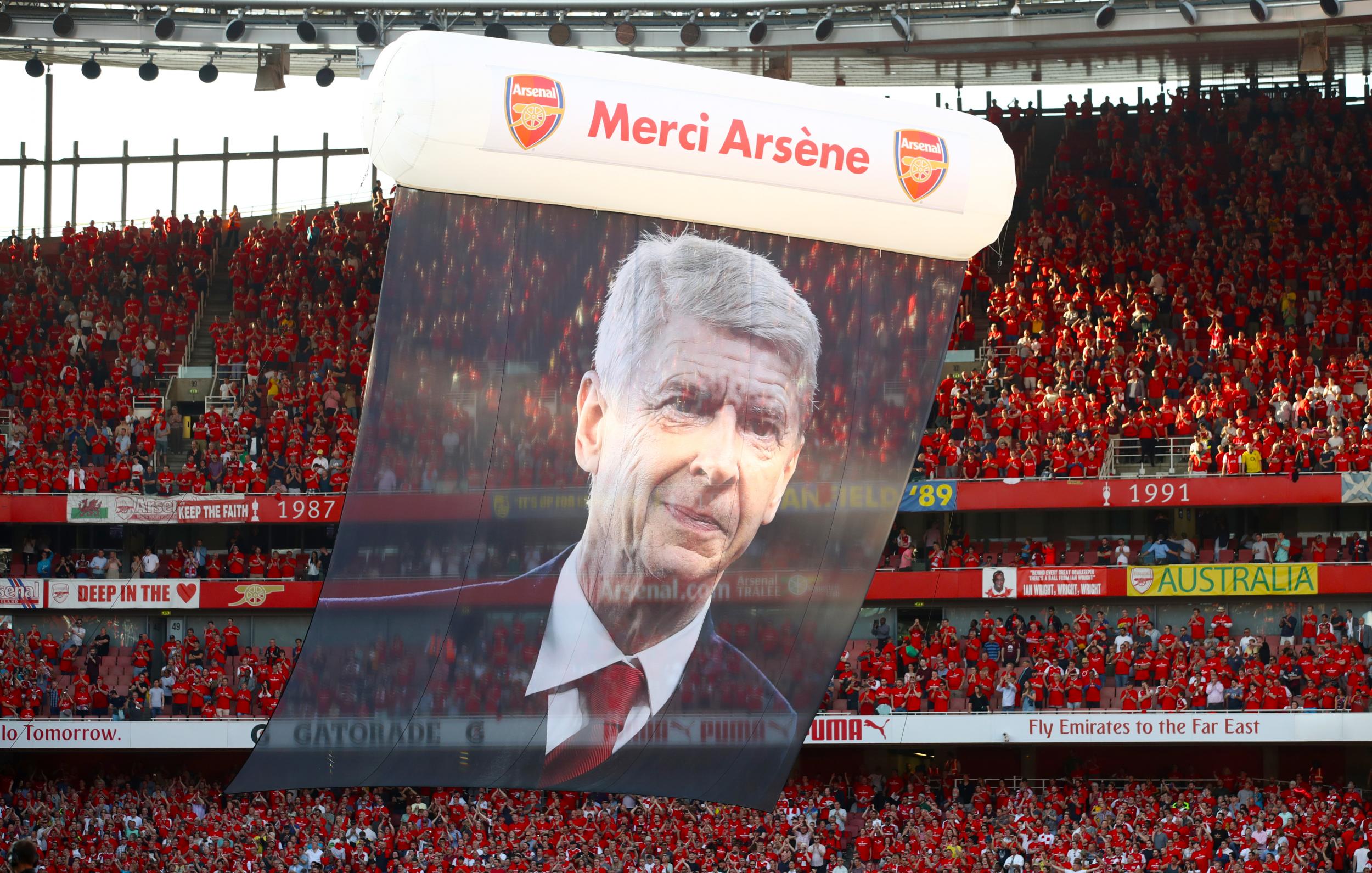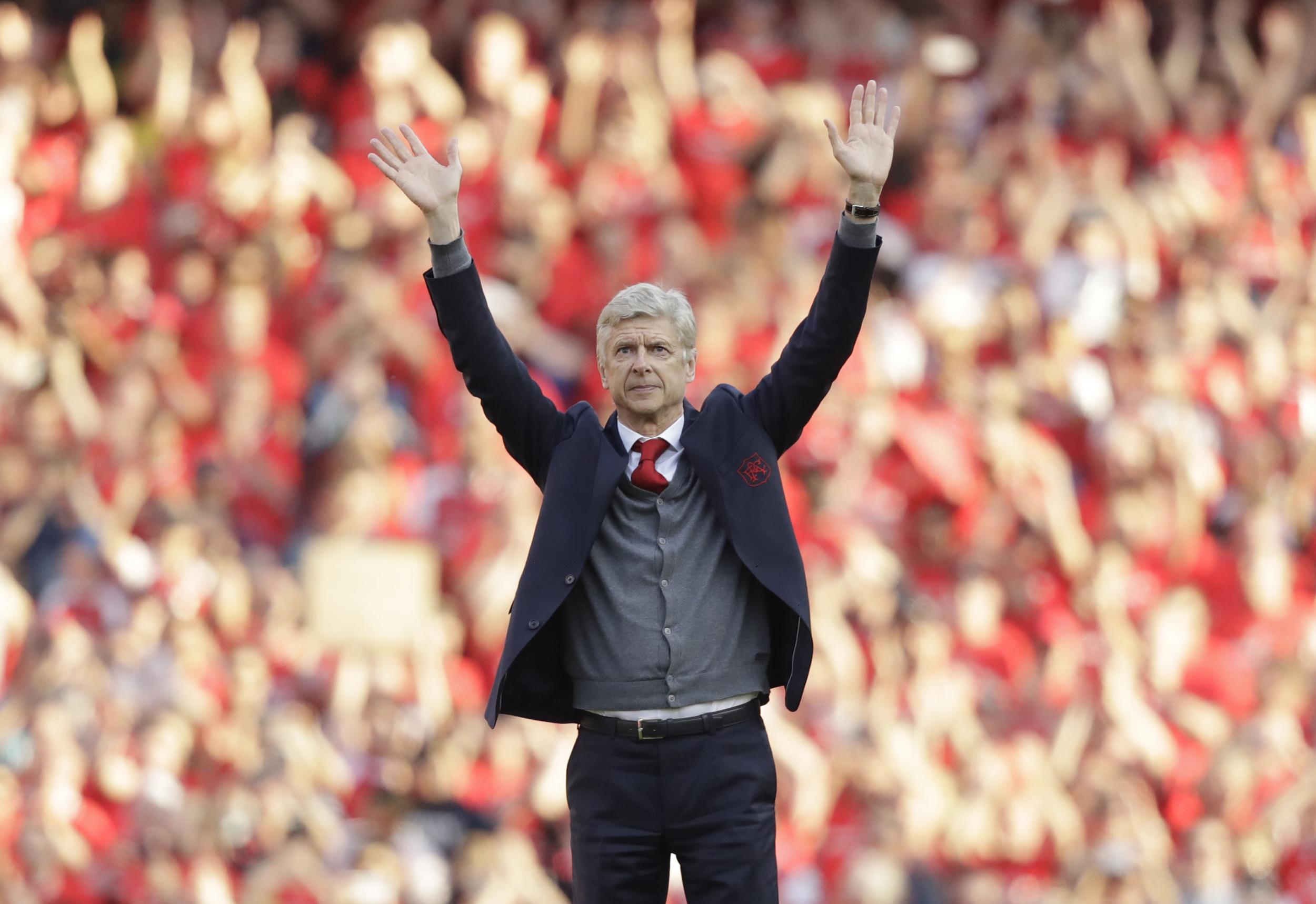A weird day at Arsenal to forebode the weirder days yet to come without Arsene Wenger – and no one knows what’s next
His farewell was a microcosm of his career: Excitement, action, something to cheer. Then an awkward abyss of nothingness with no one knowing the future

Your support helps us to tell the story
From reproductive rights to climate change to Big Tech, The Independent is on the ground when the story is developing. Whether it's investigating the financials of Elon Musk's pro-Trump PAC or producing our latest documentary, 'The A Word', which shines a light on the American women fighting for reproductive rights, we know how important it is to parse out the facts from the messaging.
At such a critical moment in US history, we need reporters on the ground. Your donation allows us to keep sending journalists to speak to both sides of the story.
The Independent is trusted by Americans across the entire political spectrum. And unlike many other quality news outlets, we choose not to lock Americans out of our reporting and analysis with paywalls. We believe quality journalism should be available to everyone, paid for by those who can afford it.
Your support makes all the difference.The end was, in the end, exactly as surreal, exactly as ridiculous, exactly as weird, as it needed to be. From the Piebury Corner pie shop on Holloway Road resurrecting, for one day only, their best-selling Wenger Knows Best pie (filling: chicken and broccoli); to the giant inflatable tubes that took to the pitch at full-time, one bearing an enormous picture of Wenger’s face, the other his haul of trophies; to the young fan holding a poster begging Wenger for his tie, and receiving it.
Some people believe football is a matter of life and death, as Bill Shankly once said. Anyone who was at the Emirates Stadium on a glorious afternoon in May 2018 will assure you that it is much, much sillier than that.
It had to be weird, because the very idea of Wenger leaving Arsenal, of someone else sitting in that dugout, of someone else wearing that tie, is nothing if not extremely strange. He alluded to it himself in his press conference afterwards, when he admitted that he would now need to “connect” with himself again, after essentially putting his emotions on pause for 22 years. And as he soaked in the applause and the songs with a crooked smile and a diffident wave, you wondered whether there was a part of him that was hating the whole thing: the mawkishness, the nostalgia, the idolatry, the ironic cheers for Per Mertesacker, all this unseemly fuss and brouhaha over a meaningless three points in a meaningless game.
But really, this day wasn’t for the benefit of Wenger at all, but for everyone else. All societies live by ritual, mark their lives by ceremony, crave clear beginnings and ends. And so for Arsenal’s fans, this was not so much a day of lament as one of catharsis, of purgation, of cleansing. For years they have talked about it, imagined it, perhaps even dreamed of it; for weeks they have known it was happening. But in order to believe it, they had to see Wenger go, and see it with their own eyes.
Wenger always talked about making people happy. Of giving them something to cheer about after a long hard week at work. Now, he was making them happy by leaving. Outside the ground, they were sad he was going. But not sad enough to want him to stay.
Rob (North Bank, first game 1980): “It should have happened before now. The last four or five seasons have been like Groundhog Day.
Richard (West Stand, first game 1996): “Something’s got to change. There’s something in the background that’s not quite right.”
Lev (Clock End, first game 2001): “Birmingham in 2008, when Gallas sat down in protest. There was a real expectation we’d win something with that young team. But that was the start of the long goodbye.”
Sul (North Bank, first game 2006): “The squads have actually been quite good over the last couple of seasons, compared to when we had Benayoun and Andre Santos. But they bought into him and played for him. And more recently, they haven’t. They’ve stopped believing.”
Val (West Stand, first game 1968): “I like his appearance. His personality. That passion and kindness. He’s a caring chap and he’s done a fantastic job. But now’s the time.”

And so they queued in the baking hot sun for souvenir programmes and commemorative scarves. They sang their songs. They fawned over the parade of legendary ex-players – Kanu, Emmanuel Petit, Santi Cazorla. One last time, they draped their banners bearing classic Wenger quotes. “Remember who you are, what you are, who you represent.” “Football should be an art.”
Pretty soon, this is all that will be left of the Wenger era at Arsenal: motifs and memes, quotes and quips, a snatched memory there, a sepia-tinted photograph there. People never really remember things in their totality, and certainly not something as long and rich and emotionally gigantic as this. People won’t even remember who they beat in his last game. Was it Burnley? Or maybe Brighton? Were Brighton in the Premier League by then? Anyway, it was definitely six-nil. Or maybe five. But they’ll remember it was sunny, and probably hotter than it actually was.
This is what time does: it weathers, it warps, it comes for us all in the end. And before long, it was time for Wenger to take his final bow. You could see him shifting uneasily from foot to foot in the tunnel as Bob Wilson paid him a warm tribute. When he finally emerged and spoke, it was in short but hesitant sentences, and through the occasional hiss of a faulty microphone. “Thank you for having me for such a long time,” he said. “But above all, I am like you. I am an Arsenal fan.
“This is more than just watching football. It’s a way of life. It’s caring about the beautiful game, the values that we cherish, as well that something that goes through every cell of our bodies. We care, we worry, we are desperate. But when we come here, we realise.
“So I would like to finish by one simple word: I will miss you. Thank you all for being such an important part of my life, and I hope to see you soon. Well done. Bye bye.”
There was a curious moment, once Wenger and his team had completed their lap of honour, and nobody was quite sure what was meant to happen next. For a few minutes, everyone just sort of stood there, milling about. Wenger made small talk with a few of his ex-players. A few fans started to drift away. The last of the sunshine had disappeared behind the West Stand. And in many ways, that curious moment of accidental dead space was a more perfect tribute to the late-Wenger era than anything you could have dreamed up on purpose.
Eventually, with what you sensed was a mixture of relief and reluctance, Wenger offered one final wave and disappeared down the tunnel, to a modest round of applause from a half-empty stadium. As he left, the tannoy announcer warned departing fans of severe delays on the Piccadilly Line. In more ways than one, it was time.
Join our commenting forum
Join thought-provoking conversations, follow other Independent readers and see their replies
Comments